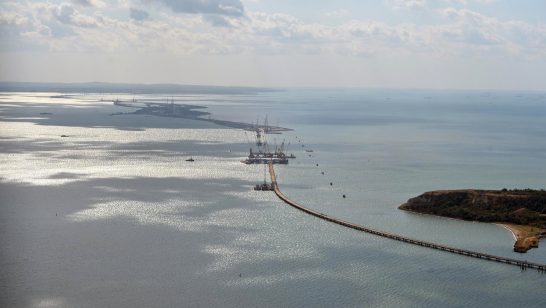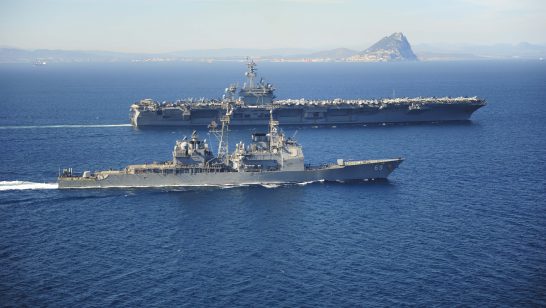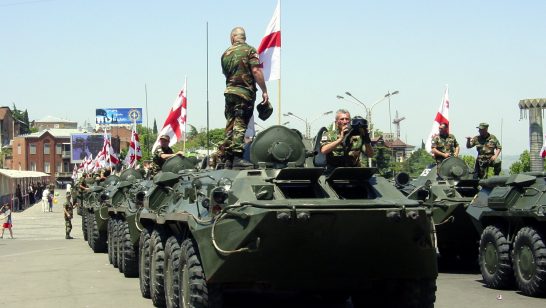
Georgia aspires to a new role as Europe’s strategic trading partner with Eurasia. Amidst a Sino-American trade war and a disorderly Brexit, this may appear as an unusual ambition. Yet, despite the turmoil within and out-with the EU, Europe remains committed to multilateral trade. The free movement of goods, services, capital and people and the pooling of sovereignty has provided the EU’s members with uninterrupted economic growth and unprecedented peace. Georgia not only wants to carve out a role for itself in this community, but to assume a new and unique position.
Georgia has always tried to make the most of its location. Residing within the South Caucasus region, it sits at the heart of dynamic markets and business opportunities, with Central Asia and China to the east, Turkey and Europe to the west, Russia to the north, Iran and India to the south.
Born in the USSR, my generation looked westwards, as we worked in the 1990s to build a highway for Caspian energy resources to Europe, from Azerbaijan to Turkey, via Georgia. This allowed European countries to diversify their dependence on Russian resources, particularly natural gas. For Georgia, this was an opportunity to establish a regional bloc with Turkey and Azerbaijan, fostering economic and diplomatic interdependence. On the basis of this relationship, these countries have developed the BTK railway network, turning the South Caucasus into a gateway for Central Asia, China, the Middle East, and India. Georgia is now completing this historic process, building the Deep-Sea Port of Anaklia.
On the western shores of the Black Sea, several Georgian Deep-Sea ports now form critical parts of trans-European transport corridors, most prominently Burgas, Costanta, Odessa, and Illichvisk. On the eastern shores, 75% of vessels cannot dock. Partly this is a geographical challenge: there are very few locations deep enough to host Panamax-type vessels. Partly, this is a political challenge: the construction of Russia’s Crimean bridge means that Ukrainian deep-sea water ports are no longer accessible. Moreover, continuous patrol ship checks make this destination less attractive. This leaves the Georgian Black Sea coast as the closest port of access to Central Asia and beyond.
Georgia’s value proposition is not about circumventing Russia. That is not our ultimate “strategic goal”. We have our own ongoing and intractable problems with Russia. Yet, the inauguration of the 16-meter Deep-Sea port of Anaklia in 2020 re-opens this part of the world to international shipping. With 75% of Black Sea vessels having nowhere to dock on the eastern shores, overland trade is only accessible by truck, or through Russia. Anaklia reopens the region to international shipping and restores multimodal access to Central Asia and the Middle East, all the way to China and India.
2019 is significant in the levels of internationally traded food commodities and other high-value cargoes. After the US and EU levied actions against Russia in response to the Crimean annexation, the export and transit of food from EU countries to Central Asia and China was disrupted. That was significant for Ukraine, which overtook the United States in 2015 to become the biggest exporter of corn to China and, incidentally, also the eighth producer of soybeans in the world. It is also significant for EU member states with important food and beverage export markets – such as Italy, the Netherlands, Poland, and Romania – seeking access to the newly emerging consumer markets in the Far East. As a consequence, China is now the biggest wine market in the world.
However, there is a broader strategic narrative at play for Europe with at least two strategic dimensions.
First, it is clear that Europe’s future is in the east. From 2000 to 2016, the Chinese government invested €800bn in 300 major “Go West” projects, mostly in transport infrastructure and energy. Chinese manufacturing is shifting inland, partly driven by a search for cheaper labour, encouraging companies like HP to consider rail shipping. Overland trade makes sense as oil prices increase and ships “slow steam” to cut fuel costs, making maritime trade slower. Meanwhile, the Chinese economy is experiencing a wider transformation. As China’s working population shrinks, China has hit the buffers on export-driven growth. Future demand in China will depend on the emergence of a mass-consumer market, which currently stands at 39% of GDP. That will mean that exports will be gradually balanced with imports.
Second, at the heart of the current Sino-American trade dispute is competition over technology transfer. The race for leadership in high-value manufacturing not only requires cutting edge European industries to be present but to drive innovation. Overland trans-Eurasian trade is likely to be the technological testing ground for the future of transportation. Electric vehicles and automation, fuel cell technology, magnetic levitation, and hyperloop connections are likely to be piloted in a trade route that is driven to achieve “shipping parity” in the cost of transport. To be present in this region is crucial to enhance Europe’s position as a global superpower.
In recognition of Eurasian trade routes being critical to the future of the European economy in September 2018 the European Commission integrated the Black Sea in its transport policy design. This is about retaining Europe’s relevance in shaping markets that will drive future growth.
As part of this effort, the Georgian gateway to Eurasia is not merely a piece of “hardware”. Since the conclusion of the Deep and Comprehensive Free Trade Agreement (DCFTA) with the EU in 2014, the Georgian government has been keen to position Georgia as an enabler of Eurasian global trade flows. Since January 2018, a Georgia-China Free Trade Agreement (FTA) went into effect. At present, Georgia and Switzerland are the only two European countries with privileged access to the EU, Chinese, and Russian markets. In 2019, Georgia expects to complete an FTA with India.
The development of a Special Economic Zone (SEZ) next to Anaklia, completes Georgia’s value proposition to European trade. In a world that contests and challenges free trade, the “Made in Georgia” brand bridges the markets of the biggest economies in the world.
Georgia’s commitment to multilateralism is not merely a consequence of free trade ideals. Georgia has often felt the crushing influence of bilateral economic, political and security ties. In a multilateral framework, Georgia can aspire to play an important role in the Euro-Atlantic relations to increase its prospects for economic growth and social development. In this framework, Georgia is open to everyone, even Russia, which occupies 20% of its sovereign territory, yet does not concede its strategic priorities, internally and externally.
Georgians wish to build a European future with all our neighbours. We cannot change our geography. We can do that with Russia or, if necessary, despite Russia, but certainly not as part of Russia. Georgia is no longer willing to be defined in “post terms,” as in “post-Soviet”, or reduced to a dependent variable on Euro-Western relations. Lingering issues – conflicts, wars, occupied territories – leave little scope for negotiation, as because Georgia will not compromise its sovereignty. But we are open, willing, and keen to engage in a constructive discussion on mutually beneficial development, where there is scope for progress, which may in time foster interdependence.
Key governance indicators – transparency, ease of doing business, rule of law – place Georgia in a European framework of governance. In a neighbourhood often tested by democratic backtracking, Georgia has recently concluded one of its most contested Presidential elections in its history, bringing to office a woman and former French diplomat with a European agenda and vision. Georgia boasts one of the most business-friendly entrepreneurial environments in Europe, low on regulation, high on transparency, low on criminality, with upward social mobility and declining levels of unemployment. Georgia may not be a fully perfect democracy yet, but we are determined to define our future in positive rather than post-colonial terms. We begin in 2019, defining Georgia as a European partner with Eurasia.
The opinions articulated above also do not necessarily reflect the position of the European Leadership Network or any of its members. The ELN’s aim is to encourage debates that will help develop Europe’s capacity to address pressing foreign, defence, and security challenge.



